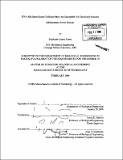| dc.contributor.advisor | Leona D. Samson. | en_US |
| dc.contributor.author | Green, Stephanie Lauren | en_US |
| dc.contributor.other | Massachusetts Institute of Technology. Biological Engineering Division. | en_US |
| dc.date.accessioned | 2006-09-28T15:12:51Z | |
| dc.date.available | 2006-09-28T15:12:51Z | |
| dc.date.copyright | 2006 | en_US |
| dc.date.issued | 2006 | en_US |
| dc.identifier.uri | http://hdl.handle.net/1721.1/34157 | |
| dc.description | Thesis (S.M.)--Massachusetts Institute of Technology, Biological Engineering Division, 2006. | en_US |
| dc.description | Includes bibliographical references (leaves 92-93). | en_US |
| dc.description.abstract | The two most common forms of inflammatory bowel disease (IBD) are ulcerative colitis (UC) and Crohn's Disease (CD), which affect more than 1 million Americans. Recently the incidence of IBD has been rising in Japan, Europe and North America.' Colorectal cancer is a very serious complication of IBD, and a patient's risk increases with increasing extent and duration of disease.2 There is no cure for CD, and the only cure for UC is removal of the entire colon and rectum. It is thought that cancer risk is based on chronic inflammation of the gastrointestinal mucosa. There have been many studies, which have supported this idea and have made progress toward understanding the link between chronic inflammation and cancer. In both UC and CD, it is known that there are increased levels of EA, cG, and eC, which are potentially miscoding lesions, in the DNA of affected tissues.3 Also, 3-methyladenine DNA glycosylase (Aag in mice), an initiator of the Base Excision Repair pathway, shows adaptively increasing activity in response to increased inflammation in UC colon epithelium.4 This thesis demonstrates the importance of Aag in protecting against the effects of chronic inflammation. | en_US |
| dc.description.abstract | (cont.) It was found that Aag deficient mice, treated with 5 cycles of dextran sulfate sodium (DSS) to induce chronic inflammation, showed significant signs of increased disease including decreased colon length, increased spleen weight, and increase in epithelial defects. Also, when treated with a tumor initiator, azoxymethane, prior to DSS exposure, Aag deficient mice show a 2.95 fold (p<0.0001) increase in tumor multiplicity compared to wild type treated animals, as well as decreased colon length, increased spleen weight, increased dysplasia/neoplasia, and increased area affected by dysplasia/neoplasia. If UC patients had a deficiency in 3-methyladenine-DNA-glycosylase activity, they would likely be more susceptible to mutations and cancer because of their inability to repair DNA damage caused by inflammatory cytokines and reactive oxygen and nitrogen species. In future studies, it would be beneficial to determine if transgenic Aag over-expresser mice show protection against the damage induced by chronic inflammation. This would make intestinal gene therapy a possible approach to finding the first cure for IBD and inflammation associated colorectal cancer. | en_US |
| dc.description.statementofresponsibility | by Stephanie Lauren Green. | en_US |
| dc.format.extent | 93 leaves | en_US |
| dc.format.extent | 4988471 bytes | |
| dc.format.extent | 4992321 bytes | |
| dc.format.mimetype | application/pdf | |
| dc.format.mimetype | application/pdf | |
| dc.language.iso | eng | en_US |
| dc.publisher | Massachusetts Institute of Technology | en_US |
| dc.rights | MIT theses may be protected by copyright. Please reuse MIT thesis content according to the MIT Libraries Permissions Policy, which is available through the URL provided. | en_US |
| dc.rights.uri | http://dspace.mit.edu/handle/1721.1/7582 | |
| dc.subject | Biological Engineering Division. | en_US |
| dc.title | DNA alkylation repair deficient mice are susceptible to chemically induced Inflammatory Bowel Disease | en_US |
| dc.title.alternative | Deoxyribonucleic acid alkylation repair deficient mice are susceptible to chemically induced IBD | en_US |
| dc.type | Thesis | en_US |
| dc.description.degree | S.M. | en_US |
| dc.contributor.department | Massachusetts Institute of Technology. Department of Biological Engineering | |
| dc.identifier.oclc | 69019092 | en_US |
